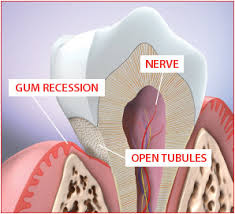An Ode to Ice Cream

To my tongue, you are delicious, flavorful, and bold
But when you touch my teeth, I want to scream in pain
I love you, sweet ice cream…but I fear my love’s in vain
If you can relate to the above poetry, you have sensitive teeth. Sensitive teeth are no fun. They affect your everyday life. You avoid very hot or cold foods, drink through a straw, breathe through your nose, etc.
The team at Overland Park Dentistry understands. We want to help you with your sensitive teeth. Read on to learn more about causes and treatments for sensitive teeth.
What Causes Sensitive Teeth?

Other things that can cause sensitive teeth are:
- Damage – Chipped or broken teeth can become infected and the bacteria from that infection can enter the pulp, causing inflammation
- Teeth Grinding – Grinding your teeth may wear down the enamel and expose the dentin
- Wear and Tear – Brushing too hard can wear down enamel and expose the dentin
- Tooth Decay – If tooth decay is near the gum, it can expose the dentin
- Gingivitis (gum disease) – Swollen and aggravated gums pull back and can leave the dentin or roots of your teeth exposed
- Tooth-Whitening Products – These products can make teeth more sensitive
- Plaque Buildup – Plaque on the root surfaces can cause sensitivity
- Acidic Foods – Foods with acid can wear down enamel
- Dental Work – Teeth cleaning, crown placement, etc. can make teeth sensitive; this sensitivity is usually temporary and should go away in a month to six weeks
Treating and Preventing Tooth Sensitivity
If you suffer from sensitive teeth, the first step is to schedule an appointment with a dentist to identify the cause. Once you know the cause, there are several options that can provide relief:
- Watch What You Eat – You can help yourself by avoiding highly acidic foods and drinks (carbonated drinks, coffee, citrus fruits, and even yogurt)
- Try a New Toothpaste – For some people, simply switching to a desensitizing toothpaste helps relieve the pain (it may take several brushings to start noticing a difference). Don’t be afraid to try different brands to see if one is more effective than another
- Change Your Toothbrush & Brushing – Switching to a softer toothbrush and brushing more gently may help retain the enamel near your gums and keep them from receding
- Use Fluoridated Dental Products – Using a fluoridated mouth rinse every day can help decrease sensitivity
- Use a Mouthguard – If you grind your teeth at night, use a mouthguard to stop the damage
- Crowns or Bonding – Your dentist may apply a crown, bonding (white fillings), fluoride varnish, or dentin sealers to the exposed root surface of a sensitive tooth. This will counteract decay or lack of enamel
- Root Canal – Though these words strike fear into the heart of many people, it can help those who have sensitivity when other options have failed. With today’s dental procedures, pain is minimal and it’s a small price to pay for permanent relief from sensitive teeth
